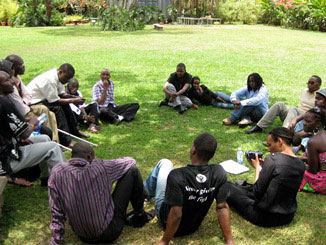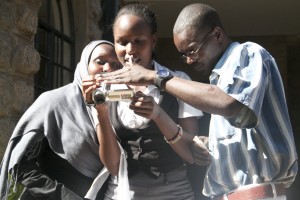 During the May workshop the fellows were ask to reflect over their fellowship experience. To this effect the fellows were asked questions regarding the meaning of the fellowship program, what their expectations are, what they are willing to commit to and what needs to improve to make the…
During the May workshop the fellows were ask to reflect over their fellowship experience. To this effect the fellows were asked questions regarding the meaning of the fellowship program, what their expectations are, what they are willing to commit to and what needs to improve to make the…
fellowship program more efficient. The purpose of this exercise was to re-establish the purpose of the fellowship while reiterating the specific objectives it is meant to achieve and how the fellows’ activism is able to fit within the set objectives.
It is important to emphasize that while there are set Read More
 In the month of May Kiama Kaara introduced discourse on the concept of the commons. From this interaction the fellows were able to learn that Social Justice advocates for the Common goods of life. The fellows also appreciated the fact that the commons of the world are being unjustly held in the hands of a few at the expense of the many.
In the month of May Kiama Kaara introduced discourse on the concept of the commons. From this interaction the fellows were able to learn that Social Justice advocates for the Common goods of life. The fellows also appreciated the fact that the commons of the world are being unjustly held in the hands of a few at the expense of the many.
Such is the case as exhibited by issues to do with water and housing for instance. Activists and social movements are the agents that challenge the power relations when it comes to access, equity and equality Read More
 An interaction with John Njehia, a fellow with the FPAF, will immediately reveal his keen sense of purpose in the work he does – advocacy for the urban poor in the ensuring of security of land tenure and proper housing. His area of focus is largely in Nairobi’s Mathare ‘informal settlement’ schemes. John is an active member of the Muungano Wa Wanavijiji, Federation of Slum Dwellers, movement.
An interaction with John Njehia, a fellow with the FPAF, will immediately reveal his keen sense of purpose in the work he does – advocacy for the urban poor in the ensuring of security of land tenure and proper housing. His area of focus is largely in Nairobi’s Mathare ‘informal settlement’ schemes. John is an active member of the Muungano Wa Wanavijiji, Federation of Slum Dwellers, movement.
During a visit with John several weeks ago, we had the privilege of better appreciating the movement’s struggles and efforts in pursuing the needs of the urban poor in Mathare. Read More
 Can Pigs Talk? This was the question posed to the Fellows by Dr Steve Ouma during the May workshop.
Can Pigs Talk? This was the question posed to the Fellows by Dr Steve Ouma during the May workshop.
This was rather interesting considering that one of the fellows, Emily Kwamboka, had been part of the protest match that took their grievances to the very doors of parliament.
Emily has been a long time member of the Bunge La Mwananchi, The People’s Parliament. This is a movement that seeks to increase public participation and awareness of issues in the society. This movement was instrumental in the mobilization of the Kenyans that took part in the picketing excercise.
The Fellows Read More

The Adilisha program will be holding a movement building boot camp for activists’ from social justice movements and organisations in Lesotho, Namibia, Zambia, Zimbabwe and Malawi.The boot camp being held in Lusaka, Zambia from May 12 to 17 will facilitate activists’ consciousness of their context from a deep analysis and connect what they are doing to the bigger picture or vision of social change they seek to achieve.
Participants will critically analyse their organising strategies and tactics to develop alternative strategies for effective and creative organising.It is also expected that the participants will derive approaches for educating political education Read More

Ruth Mumbi has been nominated for this years Front Line Award for Human Rights Defenders at Risk. The award is to recognise outstanding contributions made by human rights activists. Ruth is one of six nominees selected from a total of 90 nominations.
Two of her fellow nominees are currently in prison. Congratulations go to Ruth.
Her work has included mobilisation of women around the new constitution in Kenya. She has also focused on the rights of women farmers and their communities in Kenya, facing threats from armed thugs in the process.
About Ruth Mumbi
Ruth Mumbi from Kenya is a passionate community mobiliser, and Read More

WE ARE THE SOLUTION is a Pan African women campaign for food sovereignty and women access to resources. The WE ARE THE SOLUTION campaign sisters organized a brilliant conference in March 2013, Dakar Sénégal. Four (04) african rural women leaders engaged debate with their mate on issue of peasant seeds, women in agriculture, land grabbing and agro ecological practices for food sovereignty.
The conference took place during FIARA, an international agricultural fair. Over 100 Farmers Organization, NGO from various countries and government representatives attended the event. At the end of the conference several organized expressed their interest to be Read More

It is almost a week since the March 4th national general elections conducted by the Independent Electoral and Boundaries Commission (IEBC) and the presidential results are yet to be released. There is an impatient and restless atmosphere in the country. On this fateful day, it is about three in the afternoon and people are slowly trickling into the church hall that doubles up as a community hall in Mathare’s Stage 10 area.
The weather is chilly and virtually every patch of ground damp from the erratic rainfall this time of the year. Some women are already seated griping Read More

Fahamu is establishing a sex worker leadership initiative (SWLI) for sex worker rights activists based in Eastern and Southern Africa.The outcome of the proposed SWLI will be a strengthened sex worker movement in Eastern and Southern Africa able to translate their desired impact into concrete action plans, within which they are able to articulate theories of change, identify and engage allies as well as implement effective, innovative strategies using a diversity of tools.
Based on in-depth learning needs assessment with participants, the sex worker rights movement and global sex worker rights initiatives, we have developed a training curriculum dubbed
The Pow Wow that will guide Read More
 Across the country, pockets of Kenyans are determined to use video to protect their democracy during the March 4th elections. Bukeni Waruzi just returned from training these activists and citizen journalists, and here’s what he taught them.
Across the country, pockets of Kenyans are determined to use video to protect their democracy during the March 4th elections. Bukeni Waruzi just returned from training these activists and citizen journalists, and here’s what he taught them.
The brutality of December 2007 came as a surprise. Kenya has suffered bouts of electoral turbulence before, but that month’s elections led to unprecedented violence: killings, rapes, lootings, attacks on civilians, and massive displacement. Historically peaceful, Kenya devolved into violence that caught many unprepared—including human rights activists who were unable to use video to document the magnitude of what was happening.
Read More








